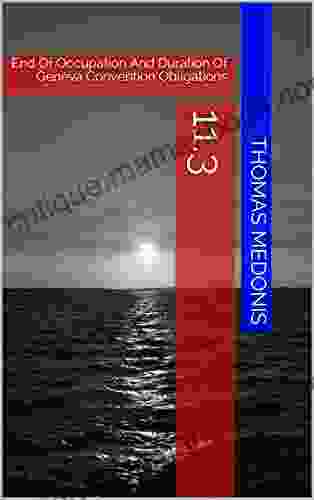End of Occupation and Duration of Geneva Convention Obligations: A Comprehensive Examination

The end of occupation marks a significant turning point in the life of an occupied territory and its population. It is a complex process that raises important legal and practical questions, particularly with regard to the duration of the obligations imposed by the Geneva Conventions. This article will examine the end of occupation and the duration of Geneva Convention obligations, exploring the various factors that can affect the termination of occupation and the ongoing responsibilities of occupying powers.
The Fourth Geneva Convention, the primary international legal instrument governing the protection of civilians during wartime occupation, does not explicitly define the end of occupation. However, the International Court of Justice (ICJ) has held that occupation ends when the occupying power "completely evacuates the territory" or when "there is a transfer of authority to a new government that is recognized by the international community" (International Court of Justice, 2004).
In practice, the end of occupation can be a gradual process. For example, an occupying power may withdraw its military forces but continue to exercise some degree of control over the territory through its civilian administration. In such cases, it may be difficult to determine the precise moment at which occupation ends.
5 out of 5
| Language | : | English |
| File size | : | 1528 KB |
| Text-to-Speech | : | Enabled |
| Screen Reader | : | Supported |
| Enhanced typesetting | : | Enabled |
| Word Wise | : | Enabled |
| Print length | : | 14 pages |
The Geneva Conventions impose a wide range of obligations on occupying powers, including the duty to protect civilians, respect human rights, and ensure the provision of basic services. These obligations continue until the end of occupation.
However, the duration of Geneva Convention obligations is not always straightforward. In some cases, obligations may continue even after the end of occupation. For example, the ICJ has held that the obligation to return stolen property to its rightful owners continues after the end of occupation (International Court of Justice, 2007).
The end of occupation can be affected by a variety of factors, including:
- The will of the occupying power: The occupying power has the primary responsibility to end the occupation. However, it may be reluctant to do so if it believes that the territory is not yet stable or if it has strategic interests in the area.
- The wishes of the occupied population: The wishes of the occupied population should also be taken into account. The population may desire independence, integration with the occupying state, or some form of autonomy.
- International pressure: International pressure can play a role in bringing about the end of occupation. The United Nations, regional organizations, and individual states can all exert pressure on occupying powers to withdraw their forces and respect the rights of the occupied population.
The end of occupation has a number of consequences, including:
- The restoration of sovereignty: The end of occupation marks the restoration of sovereignty to the occupied territory. The territory is now free to determine its own political future and to develop its own institutions.
- The lifting of restrictions: The end of occupation lifts the restrictions that were imposed by the occupying power. The population is now free to travel, work, and assemble without hindrance.
- The return of property: The end of occupation triggers the obligation of the occupying power to return stolen property to its rightful owners. This includes both private property and public property, such as archives and cultural artifacts.
- The pursuit of justice: The end of occupation does not absolve the occupying power of responsibility for its actions during the occupation. The victims of war crimes and other human rights violations can seek justice through international tribunals or domestic courts.
The end of occupation is a complex process that raises important legal and practical questions. The Geneva Conventions impose a range of obligations on occupying powers, and these obligations continue until the end of occupation. However, the duration of Geneva Convention obligations is not always straightforward, and some obligations may continue even after the end of occupation. The end of occupation has a number of consequences, including the restoration of sovereignty, the lifting of restrictions, the return of property, and the pursuit of justice.
5 out of 5
| Language | : | English |
| File size | : | 1528 KB |
| Text-to-Speech | : | Enabled |
| Screen Reader | : | Supported |
| Enhanced typesetting | : | Enabled |
| Word Wise | : | Enabled |
| Print length | : | 14 pages |
Do you want to contribute by writing guest posts on this blog?
Please contact us and send us a resume of previous articles that you have written.
 Top Book
Top Book Novel
Novel Fiction
Fiction Nonfiction
Nonfiction Literature
Literature Paperback
Paperback Hardcover
Hardcover E-book
E-book Audiobook
Audiobook Bestseller
Bestseller Classic
Classic Mystery
Mystery Thriller
Thriller Romance
Romance Fantasy
Fantasy Science Fiction
Science Fiction Biography
Biography Memoir
Memoir Autobiography
Autobiography Poetry
Poetry Drama
Drama Historical Fiction
Historical Fiction Self-help
Self-help Young Adult
Young Adult Childrens Books
Childrens Books Graphic Novel
Graphic Novel Anthology
Anthology Series
Series Encyclopedia
Encyclopedia Reference
Reference Guidebook
Guidebook Textbook
Textbook Workbook
Workbook Journal
Journal Diary
Diary Manuscript
Manuscript Folio
Folio Pulp Fiction
Pulp Fiction Short Stories
Short Stories Fairy Tales
Fairy Tales Fables
Fables Mythology
Mythology Philosophy
Philosophy Religion
Religion Spirituality
Spirituality Essays
Essays Critique
Critique Commentary
Commentary Glossary
Glossary Bibliography
Bibliography Index
Index Table of Contents
Table of Contents Preface
Preface Introduction
Introduction Foreword
Foreword Afterword
Afterword Appendices
Appendices Annotations
Annotations Footnotes
Footnotes Epilogue
Epilogue Prologue
Prologue Reese Witherspoon
Reese Witherspoon David Pilling
David Pilling Jackie Bavaro
Jackie Bavaro Anis Mojgani
Anis Mojgani Marilyn Cornelius
Marilyn Cornelius Monica Brown
Monica Brown Peter Heller
Peter Heller Mary Hiker
Mary Hiker Mary Kubica
Mary Kubica Jon Petruschke
Jon Petruschke Adam Langer
Adam Langer Robert Mccammon
Robert Mccammon Laura Hillenbrand
Laura Hillenbrand Thomas Medonis
Thomas Medonis Jean Patrick Beaufreton
Jean Patrick Beaufreton Mike Monson
Mike Monson Adam Day
Adam Day Sarah Willington
Sarah Willington Jenna Gunn
Jenna Gunn Denise O Berry
Denise O Berry
Light bulbAdvertise smarter! Our strategic ad space ensures maximum exposure. Reserve your spot today!

 Vince HayesThe Rock Soldier Story: A Timeless Tale of Courage, Sacrifice, and the Bonds...
Vince HayesThe Rock Soldier Story: A Timeless Tale of Courage, Sacrifice, and the Bonds... Carlos FuentesFollow ·7.2k
Carlos FuentesFollow ·7.2k Dawson ReedFollow ·19.5k
Dawson ReedFollow ·19.5k Gary ReedFollow ·13.4k
Gary ReedFollow ·13.4k Dion ReedFollow ·11.1k
Dion ReedFollow ·11.1k Jeffery BellFollow ·19.6k
Jeffery BellFollow ·19.6k Mitch FosterFollow ·6.5k
Mitch FosterFollow ·6.5k Devin CoxFollow ·17.2k
Devin CoxFollow ·17.2k Adam HayesFollow ·15.8k
Adam HayesFollow ·15.8k

 Dan Henderson
Dan HendersonPaper Blood: Two of the Ink Sigil
By D.S. Otis In...

 Joseph Conrad
Joseph ConradStarting Up: Critical Lessons from 10 New Schools
Starting a new school...

 William Powell
William PowellThe Peculiar World of Funny Science Fiction Comedy: Where...
Prepare yourself for an...

 Edgar Hayes
Edgar HayesUkulele Songs for Beginners: A Comprehensive Guide to...
Embark on a musical journey with the...

 Ralph Turner
Ralph TurnerDogs vs. Chickens: A Comprehensive Guide to Choosing the...
Dogs and chickens are both popular...
5 out of 5
| Language | : | English |
| File size | : | 1528 KB |
| Text-to-Speech | : | Enabled |
| Screen Reader | : | Supported |
| Enhanced typesetting | : | Enabled |
| Word Wise | : | Enabled |
| Print length | : | 14 pages |












